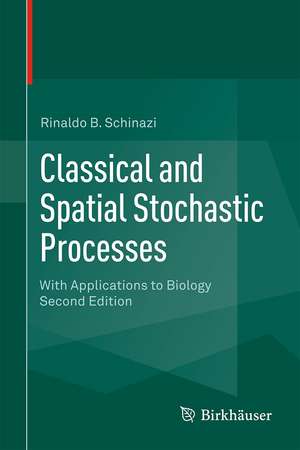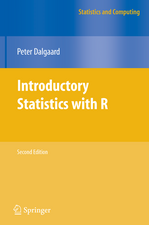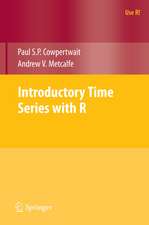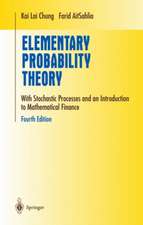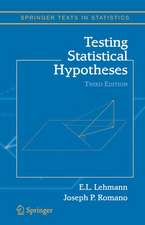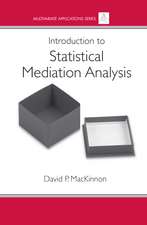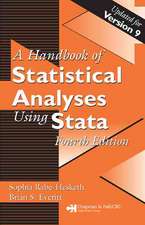Classical and Spatial Stochastic Processes: With Applications to Biology
Autor Rinaldo B. Schinazien Limba Engleză Hardback – 29 sep 2014
The second edition of Classical and Spatial Stochastic Processes is suitable as a textbook for courses in stochastic processes at the advanced-undergraduate and graduate levels, or as a self-study resource for researchers and practitioners in mathematics, engineering, physics, and mathematical biology.
Reviews of the first edition:
An appetizing textbook for a first course in stochastic processes. It guides the reader in a very clever manner from classical ideas to some of the most interesting modern results. … All essential facts are presented with clear proofs, illustrated by beautiful examples. … The book is well organized, has informative chapter summaries, and presents interesting exercises. The clear proofs are concentrated at the ends of the chapters making it easy to find the results. The style is a good balance of mathematical rigorosity and user-friendly explanation. —Biometric Journal
This small book is well-written and well-organized. ... Only simple results are treated ... but at the same time many ideas needed for more complicated cases are hidden and in fact very close. The second part is a really elementary introduction to the area of spatial processes. ... All sections are easily readable and it is rather tentative for the reviewerto learn them more deeply by organizing a course based on this book. The reader can be really surprised seeing how simple the lectures on these complicated topics can be. At the same time such important questions as phase transitions and their properties for some models and the estimates for certain critical values are discussed rigorously. ... This is indeed a first course on stochastic processes and also a masterful introduction to some modern chapters of the theory. —Zentralblatt Math
| Toate formatele și edițiile | Preț | Express |
|---|---|---|
| Paperback (2) | 382.36 lei 6-8 săpt. | |
| Birkhäuser Boston – 9 oct 2012 | 382.36 lei 6-8 săpt. | |
| Springer – 29 sep 2014 | 453.78 lei 6-8 săpt. | |
| Hardback (1) | 533.06 lei 3-5 săpt. | |
| Springer – 29 sep 2014 | 533.06 lei 3-5 săpt. |
Preț: 533.06 lei
Preț vechi: 627.13 lei
-15% Nou
Puncte Express: 800
Preț estimativ în valută:
101.100€ • 106.78$ • 84.40£
101.100€ • 106.78$ • 84.40£
Carte disponibilă
Livrare economică 15-29 martie
Preluare comenzi: 021 569.72.76
Specificații
ISBN-13: 9781493918683
ISBN-10: 1493918680
Pagini: 268
Ilustrații: XII, 268 p. 334 illus., 206 illus. in color.
Dimensiuni: 155 x 235 x 22 mm
Greutate: 0.57 kg
Ediția:2nd ed. 2014
Editura: Springer
Colecția Birkhäuser
Locul publicării:New York, NY, United States
ISBN-10: 1493918680
Pagini: 268
Ilustrații: XII, 268 p. 334 illus., 206 illus. in color.
Dimensiuni: 155 x 235 x 22 mm
Greutate: 0.57 kg
Ediția:2nd ed. 2014
Editura: Springer
Colecția Birkhäuser
Locul publicării:New York, NY, United States
Public țintă
GraduateCuprins
Discrete-Time Markov Chains.- Stationary Distributions of a Markov Chain.- Continuous-Time Birth and Death Markov Chains.- Percolation.- A Cellular Automaton.- Continuous-Time Branching Random Walk.- The Contact Process on a Homogeneous Tree.- Appendix: Some Facts About Probabilities on Countable Spaces.- Applications to Population Biology.- References.
Notă biografică
Rinaldo Schinazi is a Professor of Mathematics at the University of Colorado.
Textul de pe ultima copertă
The revised and expanded edition of this textbook presents the concepts and applications of random processes with the same illuminating simplicity as its first edition, but with the notable addition of substantial modern material on biological modeling. While still treating many important problems in fields such as engineering and mathematical physics, the book also focuses on the highly relevant topics of cancerous mutations, influenza evolution, drug resistance, and immune response. The models used elegantly apply various classical stochastic models presented earlier in the text, and exercises are included throughout to reinforce essential concepts.
The second edition of Classical and Spatial Stochastic Processes is suitable as a textbook for courses in stochastic processes at the advanced-undergraduate and graduate levels, or as a self-study resource for researchers and practitioners in mathematics, engineering, physics, and mathematical biology.
Reviews of the first edition:
An appetizing textbook for a first course in stochastic processes. It guides the reader in a very clever manner from classical ideas to some of the most interesting modern results. … All essential facts are presented with clear proofs, illustrated by beautiful examples. … The book is well organized, has informative chapter summaries, and presents interesting exercises. The clear proofs are concentrated at the ends of the chapters making it easy to find the results. The style is a good balance of mathematical rigorosity and user-friendly explanation. —Biometric Journal
This small book is well-written and well-organized. ... Only simple results are treated ... but at the same time many ideas needed for more complicated cases are hidden and in fact very close. The second part is a really elementary introduction to the area of spatial processes. ... All sections are easily readable and it is rather tentative for the reviewerto learn them more deeply by organizing a course based on this book. The reader can be really surprised seeing how simple the lectures on these complicated topics can be. At the same time such important questions as phase transitions and their properties for some models and the estimates for certain critical values are discussed rigorously. ... This is indeed a first course on stochastic processes and also a masterful introduction to some modern chapters of the theory. —Zentralblatt Math
The second edition of Classical and Spatial Stochastic Processes is suitable as a textbook for courses in stochastic processes at the advanced-undergraduate and graduate levels, or as a self-study resource for researchers and practitioners in mathematics, engineering, physics, and mathematical biology.
Reviews of the first edition:
An appetizing textbook for a first course in stochastic processes. It guides the reader in a very clever manner from classical ideas to some of the most interesting modern results. … All essential facts are presented with clear proofs, illustrated by beautiful examples. … The book is well organized, has informative chapter summaries, and presents interesting exercises. The clear proofs are concentrated at the ends of the chapters making it easy to find the results. The style is a good balance of mathematical rigorosity and user-friendly explanation. —Biometric Journal
This small book is well-written and well-organized. ... Only simple results are treated ... but at the same time many ideas needed for more complicated cases are hidden and in fact very close. The second part is a really elementary introduction to the area of spatial processes. ... All sections are easily readable and it is rather tentative for the reviewerto learn them more deeply by organizing a course based on this book. The reader can be really surprised seeing how simple the lectures on these complicated topics can be. At the same time such important questions as phase transitions and their properties for some models and the estimates for certain critical values are discussed rigorously. ... This is indeed a first course on stochastic processes and also a masterful introduction to some modern chapters of the theory. —Zentralblatt Math
Caracteristici
Enhances and expands on the title's successful first edition Provides an elementary yet very useful treatment of spatial stochastic models, with applications to mathematical biology Includes exercises at the end of chapters to reinforce concepts Relevant to a wide audience of advanced undergraduates, graduate students, and researchers in engineering, physics, and mathematical biology Includes supplementary material: sn.pub/extras
Recenzii
"An appetizing textbook for a first course in stochastic processes. It guides the reader in a very clever manner from classical ideas to some of the most interesting modern results… All essential facts are presented with clear proofs, illustrated by beautiful examples… The book is well organized, has informative chapter summaries, and presents interesting exercises. The clear proofs are concentrated at the ends of the chapters making it easy to find the results. The style is a good balance of mathematical rigorosity and user-friendly explanation." —Biometric Journal
"This small book is well-written and well-organized...Only simple results are treated...but at the same time many ideas needed for more complicated cases are hidden and in fact very close. The second part is a really elementary introduction to the area of spatial processes...All sections are easily readable and it is rather tentative for the reviewer to learn them more deeply by organizing a course based on this book. The reader can be really surprised seeing how simple the lectures on these complicated topics can be. At the same time such important questions as phase transitions and their properties for some models and the estimates for certain critical values are discussed rigorously...This is indeed a first course on stochastic processes and also a masterful introduction to some modern chapters of the theory." —Zentralblatt Math.
"This small book is well-written and well-organized...Only simple results are treated...but at the same time many ideas needed for more complicated cases are hidden and in fact very close. The second part is a really elementary introduction to the area of spatial processes...All sections are easily readable and it is rather tentative for the reviewer to learn them more deeply by organizing a course based on this book. The reader can be really surprised seeing how simple the lectures on these complicated topics can be. At the same time such important questions as phase transitions and their properties for some models and the estimates for certain critical values are discussed rigorously...This is indeed a first course on stochastic processes and also a masterful introduction to some modern chapters of the theory." —Zentralblatt Math.
